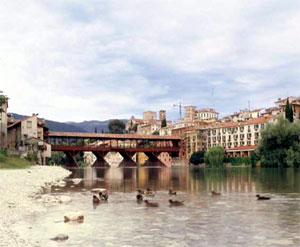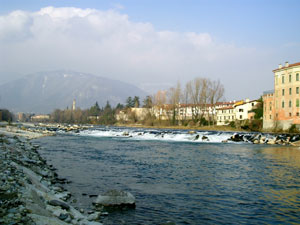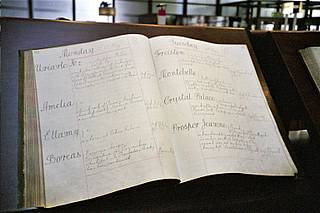Bassano sits in a stunning location by the River Brenta with
Monte Grappa in the background. It is about 35 kilometres north
east of Vicenza. The town's symbols are said to be the
Palladian bridge, white asparagus, ceramics and the Grappa
liqueur. I visited the town for the day in February 2005.  I really liked the location, the fresh air, the
fast flowing river and the picturesque bridge. If you like to be
slightly off the tourist track and would prefer a more rural
setting for short break or as a base for a touring holiday,
Bassano is ideal.
I really liked the location, the fresh air, the
fast flowing river and the picturesque bridge. If you like to be
slightly off the tourist track and would prefer a more rural
setting for short break or as a base for a touring holiday,
Bassano is ideal.
How to get there
The nearest airports are Treviso, used by Ryanair as its airport
for Venice and Venice Marco Polo. You could hire a car from the
airport. It is possible to reach Bassano by train on the Vicenzia
– Trento or Padova – Bassano lines.
History
It is often assumed that the city takes its name from the well
known liqueur Grappa. This is not the case; it is named after
Monte Grappa. The mountain's name is said to originate from
crapp or greep, meaning crag in an ancient pre-Latin language.
The liqueur Grappa's name stems from grappolo, meaning a
cluster of grapes.
Grappa liqueur has been produced in Bassano since 1779 when
Bortolo Nardini bought a Grapperia on the Brenta River bank.
Grappa is made from the by-products of wine making, the seeds,
stems and skins. The company is still run by members of the
Nardini family, accounting for around one quarter of annual
grappa production.
Ponte Vecchia has become synonymous with Bassano.  The bridge
is first mentioned in the 11th century. The bridge has been
rebuilt several times due to flooding or destruction during wars.
It is still the original design by Palladio from 1569. The bridge
is built of wood, making it more resilient to the fast flowing
River Brenta.
The bridge
is first mentioned in the 11th century. The bridge has been
rebuilt several times due to flooding or destruction during wars.
It is still the original design by Palladio from 1569. The bridge
is built of wood, making it more resilient to the fast flowing
River Brenta.
There is a record of the city on St Mary's Hill from the 10th
century. From the 14th to 18th century the city was under
Venetian rule. It became well known for the manufacture of
ceramics, wool, silk, iron and copper. The Remondini family ran
one of the most up to date printing houses in Europe from the17th
to the 19th century.
The Town Hall was first constructed in1405. Bartolomeo Ferranci
installed the present clock mechanism in 1743. The interior walls
are adorned by frescoes of 120 coats of arms.
White asparagus was first produced in the 16th century after
Bassano experienced a hailstorm which destroyed the asparagus
crop. The farmers dug up the part of the plant below the earth
and discovered that it was so tender and delicious that they
started to grow it underground permanently.
Parolini, a local nobleman, designed the Giardini Parolini in the
early 19th century. In 1829 Parolini catalogued 3000 plant
species in the garden.
During the First World War the Italians took a last stand against
the Austrians in Monte Grappa where they entrenched themselves in
tunnels and bunkers to repel the Austrian attackers. Over 12,000
Italian and 10,000 Austrian soldiers lost their lives in the
numerous battles.
During the Second World War Italian partisans hid in Monte
Grappa, organising raids on the main supply route from Germany to
the German troops stationed in Italy. In 1944 the Germans took
revenge by marching up the mountain behind women, children and
elderly local inhabitants. Any partisans discovered or civilians
suspected of assisting partisans were killed. There were public
hangings and shootings with families forced to watch.
In 1946 the Italian prime minister awarded Basssano the gold
medal for military valour. Every year the city commemorates these
events during September.
The Museo degli Alpini was established in 1948 in memory of the
Italian Alpine Troops It is located on the eastern side of the
Ponte Vecchio. You have to enter it through a cafe. I found this
rather confusing but the museum is down stairs to the left when
you enter the cafe. Originally the collection was very small but
has grown as more war relics have been gathered together. There
are many original photos, uniforms and armoury.
Museo della Cermica is near the eastern side of the Ponte
Vecchio. The building was constructed as the residence of Ferrari
family, owners of a local silk factory. The entrance hall is
adorned with a fresco by Giorgio Anseli. There are pieces of
engraved ceramics from medieval times, Mainardi majolica pieces
from the 17th and 18th century, along with modern pieces.
The Civic Musuem is one of the oldest in the Veneto region. It
was built in1828 on the site of the convent of St Francis. It
houses a collection of paintings by the Da Ponti family,
Guariento and Magnasco, a collection of prints by the Remondini
family. There is also an archaeological section and pieces by
Antonio Canova.
Bassano boasts several churches. San Donato was built in 1208. It
is claimed that St Francis of Assisi and St Anthony of Padua both
stayed here during the third decade of the 13th century. The
church was a hospital, run by Benedictine nuns in the 14th
century, then a Fransican monastery during the 15th century. The
church was restored in 1900, including work being done on the
cell which was used by the two saints.
The Church of San Francesco was started in the mid 12th century,
after the return of Ezzelino 11, the Stutterer, from the Holy
Land. The Church of St John the Baptist was originally built in
1308 but reconstructed in the 18th century by local architect
Giovanni Miazzi. Giambattista Piazzetti made the altarpiece of
John the Baptist and Orzio Marinali created the statues of angels
and the bas-reliefs.
The Cathedral of Holy Mary was a 10th century parish church in
the original high part of the town. The present cathedral dates
from the 17th century. The high altar piece and the painting of
St Stephen are the work of Leandro di Ponte, and the sculptures
are by Mainali. Di Giacomo Dacci made the organ and the three
ceiling paintings are by Volpata.
Day trips
Marostica
Marostica is a 14th century medieval town where the original town
wall stands intact. It is best known as the “town of
chess”. Every second year a match, with people dressed in
elaborate costumes to portray the pieces, is played on the giant
chessboard below the castle. This takes place on the second
Friday, Saturday and Sunday every second year, when the year ends
in an even number. This commemorates the chess match played in
1454 when the victor was to win the hand in marriage of Lianora,
the daughter of the Lord of the Castle of Marostica. Two suitors,
Rinaldo d'Angarano and Vieti da Vallonara, had fallen in love
with Lianora and were to fight a duel to see how would marry
Lianora. The Lord forbade the duel and order decreed that the
victor of the chess match would marry Lianora. However all was
not lost for the defeated suitor, as he would marry Lianora's
younger sister, Oldrata. The period costumes are permanently
displayed in the Lower Castle. 
Marostica holds a Cherry Festival every year during May and June.
There are kiosks in the streets selling a variety of cherries
including morello, roame, marostagne and sander. There is an
annual exhibition of comic cartoons in the town. Every July and
August local craftsmen display their work the exhibition hall of
the Lower Caste. There are some lovely walks through the
surrounding hills.
Asola
Asola is a charming hilltop town, with a castle, a cathedral with
a altar piece by Lorenzo Lotto and the 15th century Palazzo della
Ragione. It was called the “city of one thousand
horizons” by Giosue Carducci, because of all the fantastic
views. It was much favoured by the Venetian nobility. Caterina
Corona, the former Queen of Cyprus, lived here in the late 15th
century. Robert Browning, the English poet, bought a house ere in
the mid 17th century. Eleanora Duse, credited with being the
greatest actress of the Italian stage was also a resident. The
travel writer Freya Stark was brought up in Asolo and spent a lot
of time here between her various expeditions. There is an
antiques market every second weekend of the month, except during
July and August.
Karen Bryan is an independent travel consultant and writer,
specialising in less well known destinations in Europe. Her
websites are: www.europealacarte.co.uk,
www.europe-culture-activity-tours

 London Open
House day back in September was lovely and sunny. The Beetle was
not in the country to accompany Padmasana as she usually does, to
various places around central London to look around buildings
opened to the public for one or two days only, culminating in a
good fry up at the 24hr greasy spoon café in Smithfield. Next
year, maybe!
London Open
House day back in September was lovely and sunny. The Beetle was
not in the country to accompany Padmasana as she usually does, to
various places around central London to look around buildings
opened to the public for one or two days only, culminating in a
good fry up at the 24hr greasy spoon café in Smithfield. Next
year, maybe!

 I then
walked along Fenchurch Street to number 60, where there were no
lines at the Vitro building, so was able to go straight up in the
lift to the 11th floor to see great views of the Tower of London,
the Gherkin and I could even see the London Eye.
I then
walked along Fenchurch Street to number 60, where there were no
lines at the Vitro building, so was able to go straight up in the
lift to the 11th floor to see great views of the Tower of London,
the Gherkin and I could even see the London Eye.

 The drive
ends with a huge rock arch which you drive through, up a hill and
park up a hill the other side.
The drive
ends with a huge rock arch which you drive through, up a hill and
park up a hill the other side.
 After they
had covered about 20 miles the bushranger suddenly
disappeared…The tracks led up to a wild cavern and into
it…and burst again into open day, and the route lay along a
rugged gorge for some three miles. Here the bushranger again
disappeared…All about were evidences of careful cultivation,
the bushranger having laid out quite a nice little farm.
Satisfied that he had run down his bird, Whalan retraced his
steps…When he returned home he told his brother Charles of the
strange country he had wandered into. 'I have been through
the Devil's Coachhouse,' he said. Next day a party was
made up, and with the aid of troopers McKeown was captured. His
hiding place was a huge hole in the mountain-side, known now as
McKeown's Hole…McKeown lived to return from a long term of
exile on Norfolk Island and to re-visit the scene of his former
exploits.”
After they
had covered about 20 miles the bushranger suddenly
disappeared…The tracks led up to a wild cavern and into
it…and burst again into open day, and the route lay along a
rugged gorge for some three miles. Here the bushranger again
disappeared…All about were evidences of careful cultivation,
the bushranger having laid out quite a nice little farm.
Satisfied that he had run down his bird, Whalan retraced his
steps…When he returned home he told his brother Charles of the
strange country he had wandered into. 'I have been through
the Devil's Coachhouse,' he said. Next day a party was
made up, and with the aid of troopers McKeown was captured. His
hiding place was a huge hole in the mountain-side, known now as
McKeown's Hole…McKeown lived to return from a long term of
exile on Norfolk Island and to re-visit the scene of his former
exploits.”

 Jeremiah
Wilson, a keen caver explored the end of the Elder Cave and in
1879 descended a shaft and rockpile to discover the Imperial
Cave. This was soon followed by the discovery of the “Left
Imperial” in 1880 (renamed the Chifley Cave in 1952 after
Prime Minister J.B Chifley). Development within the caves of
pathways and the protection of formations along with electric
lighting started in 1887. Even more caves were discovered in
1903, despite exploration being made only by candlelight. Today,
over 250,000 visitors make tours of the Jenolan caves.
Jeremiah
Wilson, a keen caver explored the end of the Elder Cave and in
1879 descended a shaft and rockpile to discover the Imperial
Cave. This was soon followed by the discovery of the “Left
Imperial” in 1880 (renamed the Chifley Cave in 1952 after
Prime Minister J.B Chifley). Development within the caves of
pathways and the protection of formations along with electric
lighting started in 1887. Even more caves were discovered in
1903, despite exploration being made only by candlelight. Today,
over 250,000 visitors make tours of the Jenolan caves.
 I really liked the location, the fresh air, the
fast flowing river and the picturesque bridge. If you like to be
slightly off the tourist track and would prefer a more rural
setting for short break or as a base for a touring holiday,
Bassano is ideal.
I really liked the location, the fresh air, the
fast flowing river and the picturesque bridge. If you like to be
slightly off the tourist track and would prefer a more rural
setting for short break or as a base for a touring holiday,
Bassano is ideal.
 The bridge
is first mentioned in the 11th century. The bridge has been
rebuilt several times due to flooding or destruction during wars.
It is still the original design by Palladio from 1569. The bridge
is built of wood, making it more resilient to the fast flowing
River Brenta.
The bridge
is first mentioned in the 11th century. The bridge has been
rebuilt several times due to flooding or destruction during wars.
It is still the original design by Palladio from 1569. The bridge
is built of wood, making it more resilient to the fast flowing
River Brenta.

 Trip
duration: 56 days
Trip
duration: 56 days
 I'm also sad to
report that shortly after I left the Torres del Paine national
park an intense forest fire broke out which has now been burning
for 3 weeks. Over 14,000 acres have been destroyed and wildlife
has fled from the area and the entire park closed in what was
peak season.
I'm also sad to
report that shortly after I left the Torres del Paine national
park an intense forest fire broke out which has now been burning
for 3 weeks. Over 14,000 acres have been destroyed and wildlife
has fled from the area and the entire park closed in what was
peak season.



 We are sorry
to say that Mac is not very well, but he is still e-mailing
strong and recently sent the Beetle a collection of travel
reminiscences.
We are sorry
to say that Mac is not very well, but he is still e-mailing
strong and recently sent the Beetle a collection of travel
reminiscences.